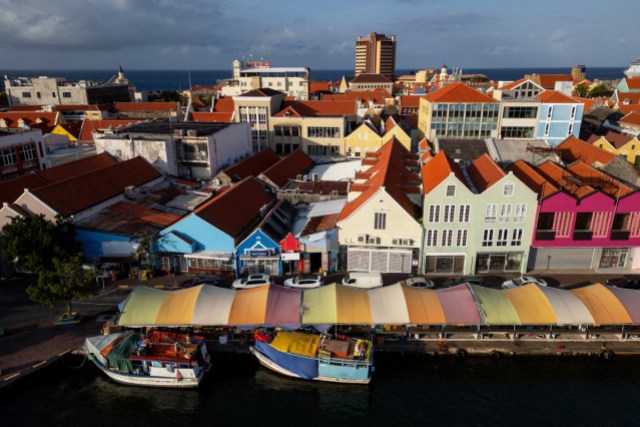
Four generations of Corderos have crossed the 100-kilometre sea to sell fruits and vegetables at the symbolic Willemstad floating market between Venezuela and Curaçao, which has recovered in recent months after four difficult years of border closure.
“We have the best of the best,” one of the vendors tells a woman from Curacao who asks about the price of avocados, while a few tourists walk along the boardwalk and gaze curiously at the colorful market.
“It was much more difficult. “A lot of people depend on it,” says Rene Cordero, 32, remembering the days of the closure. “The reopening was very good news for everyone, for Venezuelans and Curacaos, because This creates sources of income for all.”
Like his father, his grandfather and great-grandfather, René lives in this picturesque market – a place in Curaçao tourist guides next to the multicolored colonial-style buildings of Willemstad and its beaches – which is slowly returning to normality.
Venezuela’s borders with Curaçao, Aruba and Bonaire, Caribbean islands belonging to the Kingdom of the Netherlands as autonomous countries, were closed by order of the government of Nicolás Maduro in 2019 and reopened in April 2023.
Curaçao had received food and medicine sent by the United States as “humanitarian aid” requested by opposition leader Juan Guaidó, who was then described by the White House as Venezuela’s “president-in-charge” in an unsuccessful attack to remove Maduro from power. Recognition was given.
The diplomatic crisis meant a halt for this market that began with the refinery operating in Curaçao, established in 1918. Greater demand for food, more money and an opportunity for populations in Venezuela passing through the Caribbean.

long tradition
The sun has not risen yet. You hear a radio from Venezuela: An announcer reviews the performance of Venezuelan baseball players in Major League spring training and then the national anthem plays. Corderos and his crew, meanwhile, sort the merchandise before unpacking.
“I took my first trip with my father when I was 16,” René’s father Ramon tells AFP. “It’s not easy, but we’re here.”
“I always tell people when we travel: ‘From the moment you get out of bed to the moment you go back to your bed, it’s work and work,'” Ramon laughs.
The family’s boat, Francisca I, floats past their vegetable stand after making an eight-hour trip across the Caribbean from La Vela de Coro (Falcon state, northern Venezuela).
These traders buy their goods from large import and export ships arriving in Curaçao, many of which also come from Venezuela, and resell them on the market. They stay in Willemstad for two months before returning home to plan their next journey.
Mandatory repairs to ships have been a major hurdle due to the damage they suffer while anchored for long periods of time. Six of the approximately 30 vessels remain active in the dynamics of the floating market before closure.
Ramón sold the animals from his pig farm to raise the necessary funds and came to stake out the dangerous migration route of the Darien jungle, the crossroads between Colombia and Panama leading to the United States. He says that while he had visited seven countries, he returned to Venezuela because of President Joe Biden’s strict immigration policy.
And it coincides with the reopening of the border between Venezuela and Curaçao.

Sign
“The prices here are a little more comfortable than if you go to the supermarket and everything is fresh,” says Carlos Veris of Curacao after shopping with his wife.
Tourists are important in the equation.
“Cruise ships come nearby and that helps us a lot,” says René.
During the closure, Curaçao authorities allowed Haitian artisans, who remain there today, to work in the market, along with Venezuelan vendors.
A plaque on the street, donated by the refinery in 2007, celebrates this tradition: “This floating market has been a symbol of the brotherhood and sisterhood of two neighboring and brother towns for almost a century.” AFP




